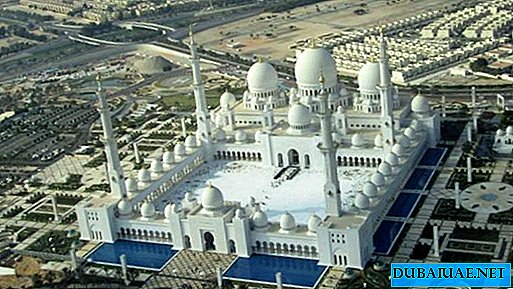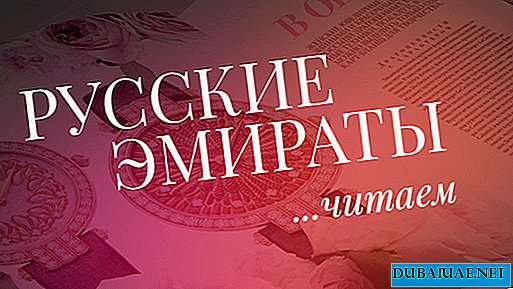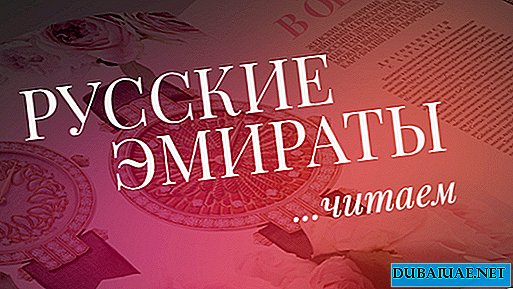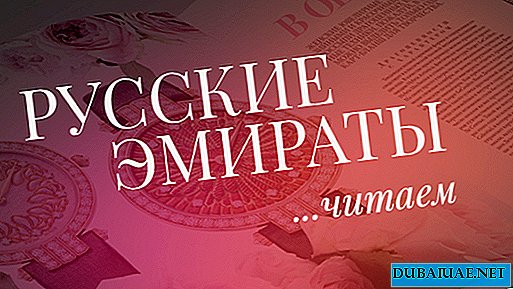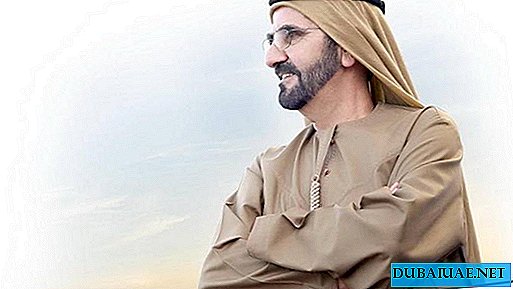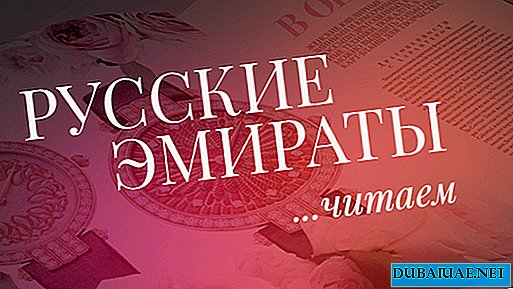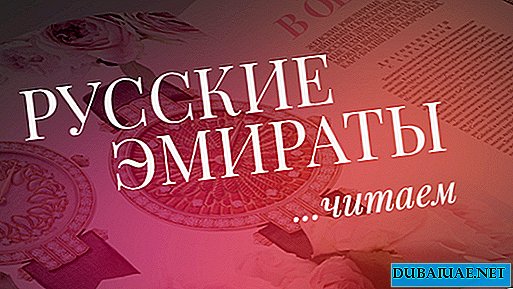
 Zhanar, not just the wife of Askar Musinov, Ambassador Extraordinary and Plenipotentiary of Kazakhstan to the UAE, is a young, beautiful and energetic woman whom God has awarded not only with many talents, but also with outstanding leadership qualities. Probably, these were precisely the friends of strong and proud steppe batyrs sung in Kazakh national epics. Whether it is true or not, I decided to ask Zhanar herself, who kindly invited us to a charity tea party in honor of the first anniversary of the creation of the Abu Dhabi Women's Association.
Zhanar, not just the wife of Askar Musinov, Ambassador Extraordinary and Plenipotentiary of Kazakhstan to the UAE, is a young, beautiful and energetic woman whom God has awarded not only with many talents, but also with outstanding leadership qualities. Probably, these were precisely the friends of strong and proud steppe batyrs sung in Kazakh national epics. Whether it is true or not, I decided to ask Zhanar herself, who kindly invited us to a charity tea party in honor of the first anniversary of the creation of the Abu Dhabi Women's Association.
In the framework of this event, in addition to a story about the history and culture of Kazakhstan, shows of some folk traditions and luxurious national costumes, as well as incredible beauty of holiday treats, a charity bazaar was held, the funds from which were transferred to one of Kazakhstan's orphanages. With Zhanar, who actively participated in both preparing and holding the holiday, we managed to retire and talk about the role of women in the modern world.
Tell me, Zhanar, how do women of the East differ from Western women?
Eastern women are unique in that they are sometimes not visible. We always stand behind our husbands, we support them. But how the husband’s work is going, how successful his work is, always depends on how things are going in the family. Therefore, an oriental woman is strong not because she flaunts herself, but because she always remains in the shade and keeps her hearth. These unwritten rules were passed on to me from my mother. My dad was always in leadership work, in recent years he was akim (main administration - approx. Ed.) Of the district, and since childhood I was brought up on the example of my mother, her relationship with her husband and children. I know how to properly care for my husband and my family.
An important stage of my life, therefore, I think, was the time when I tried to help my husband in his work and career development, supported him. But when I saw that he was already strong, I began to pay more attention to children, as they began to grow up. I watched the children when my husband was on long business trips, worked, studied at graduate school, defended a dissertation. Now the eldest daughter has already graduated from our institute, works in Dubai, the youngest is studying in America. And the youngest son is still studying at school, but also shows promise - he plays sports, music, reads a lot.
Perhaps you, as a mother, miss your daughter, who is so far from you at the moment?
You know, I’m not so much missing, as I constantly try to support my daughter, telling her that time away from family will fly by very quickly. As the eldest daughter used to say when she studied in Moscow. She graduated from MGIMO. But while studying, it used to be, and cried at first, but now the other way around - she misses Moscow all the time. So I say to the youngest that she probably will not stay in America for her whole life, but meanwhile, two years have already passed. There is a strong school, but there is no greater wealth than a good education. Of course, she misses mom and dad, our national food. I also try to prepare my youngest son for the future.
So you have three children?
Yes. The eldest daughter Aisha, she is 23 years old, the middle daughter Sania and the youngest son Nursultan, he studies here at school and plays the piano. Our son was born when my husband worked in the Protocol Service of the President of Kazakhstan.
Our eldest daughter was born in Libya, dad called her Aisha, which means “living, living” in Arabic. Then my husband and I just graduated from the institute, Askar went to work in Libya as a military translator. There we lived in a small military town ElBeyda. Askar was the only translator for the entire garrison, so he had to work day and night. And then her husband was promoted, and he began working as a translator in college. And then, in my eighth month of pregnancy, I moved with him to another city for a thousand kilometers. It was necessary to transfer this flight on a military aircraft. My husband then told me that I myself decide whether to move us to a new place or not. But I saw how he wanted to get a new job, and of course I supported him. Life in the new place was interesting, but the political situation in Libya was difficult then. Side by side, we lived together and worked with children from all the republics of the former Soviet Union. By the way, then I learned how to cook well.
Emirates - what is the account of a foreign business trip?
Before the Emirates were Libya, Saudi Arabia, Great Britain, Egypt, then again Saudi Arabia. It turns out that this is our sixth business trip abroad.
Please tell me, in which institute did you study?
My husband and I both graduated from Leningrad State University. He is a graduate of the Faculty of Oriental Studies, I graduated from the Faculty of Psychology. There we met, and in the fifth year we got married. So fate brought us together. From Leningrad we immediately left for Libya, where we worked for three years, though I stayed there for only two years, as the bombing began, and my little daughter and I left for Kazakhstan. But, probably, there is no silver lining. In Kazakhstan, I got a job as a teacher at a university. My mother helped raise her daughter so that I could work. Of course, after the break it was difficult to get involved in teaching, but my husband’s parents helped and shared their teaching experience, since they had been working in the system of Kazakhstani higher education for many years. To this day, they work in universities of Kazakhstan, dad teaches the Kazakh language for the Russian audience, and mother - Russian for the Kazakh audience. Then, when my husband returned from a Libyan business trip, he began to work in the Ministry of Foreign Affairs of Kazakhstan, and after a while he was sent to work at the USSR Embassy in Saudi Arabia. It was 1991, and the collapse of the Soviet Union had just begun. Therefore, we stayed in Saudi Arabia for only a year, but then my husband had the opportunity to work in the Soviet embassy, with experienced diplomats. My oldest daughter even started studying there in an Arab school. In 1992, we returned to Kazakhstan, I entered an internship, and later in graduate school, which I successfully completed and defended my thesis. The time was not easy. The children were small; their apartment was not yet.
My husband has been working in the Ministry of Foreign Affairs since 1987, he started from the smallest post, gradually grew to the head of the Consular Services Department, raised a galaxy of young diplomats who successfully work in the embassies of Kazakhstan in different countries of the world. I also meet my students and am amazed at how quickly time flies by, like an instant. In 1989, we got our first apartment, at the same time our second daughter Sania was born, by the way, we also called her an Arabic name, it means "successful." I believe that the name determines the fate of a person.
Zhanar, and many people think that the wives of diplomats are spoiled princesses who are only occupied with themselves, accompanying husbands on their trips abroad ...
Indeed, the princesses (laughs). Somehow the guests came to us, and one woman asked me: "Where do you get so much energy from?" And my husband replied to her instead of me: "This is her mother." And really, my mother was like that. She always got up early, about five in the morning, went to bed very late. And sometimes, looking at her, it was hard to even imagine that she was the wife of the secretary of the district committee of a huge region. She was a real hard worker with me, but, unfortunately, she died very early, at 65. Our house was visited by presidents, astronauts, and many other interesting people. Everyone always praised her dastarkhan. Now many say that since my mother passed away, they have never seen such a festive table. And, apparently, I still adopted this mother’s school. Although, I remember myself when I studied in Leningrad, then I lived in different cities, and, in my opinion, was never economic. I didn’t know anything, but, probably, many skills were transferred from my mother and, of course, this is a school of life. Sometimes I do something and think: “How do I know how my mother did this?”
You have been to many countries of the East, moved with young children. How did you manage to and still manage to combine everything - both study, work, home, and support of your spouse?
I don’t know, somehow it turns out by itself. So, in preparation for today's event, Ms. Loretta, the head of the Women's Association of Abu Dhabi, asked me: "And who will you apply makeup, comb you?" I told her: "We will do everything ourselves - both make-up and hairstyles." She was so surprised. But we, really, are always always ourselves, no one does anything on purpose with our faces. Firstly, it is nature, and secondly, our own work, daily self-care. I think that the wives of the employees of our embassy, maybe someday will remember me with a kind word.
 When we were leaving Saudi Arabia, one person told me: “When I went here, I was very afraid, because everyone knows that Askar Musinov is a very demanding and strict person. But before leaving, they told me that if you go through his school, you can work anywhere in the world, at any embassy. And now I’m convinced of this. " These his words sunk into my soul. Therefore, I, in turn, try to teach our girls something (the wives of embassy employees - approx. Ed.). For some reason, I always think that all our Kazakh girls are able to do everything the same as me. But many, it turns out, do not know how to bake Baursaki, our national bread, with which we were born and raised. Even some older women who come do not know how our national dishes are prepared. And now they have learned all this, and they have such beautiful dastarkhans, rich and tasty that they can write cookbooks themselves.
When we were leaving Saudi Arabia, one person told me: “When I went here, I was very afraid, because everyone knows that Askar Musinov is a very demanding and strict person. But before leaving, they told me that if you go through his school, you can work anywhere in the world, at any embassy. And now I’m convinced of this. " These his words sunk into my soul. Therefore, I, in turn, try to teach our girls something (the wives of embassy employees - approx. Ed.). For some reason, I always think that all our Kazakh girls are able to do everything the same as me. But many, it turns out, do not know how to bake Baursaki, our national bread, with which we were born and raised. Even some older women who come do not know how our national dishes are prepared. And now they have learned all this, and they have such beautiful dastarkhans, rich and tasty that they can write cookbooks themselves.
By the way, I am amazed at what they themselves did manually for presentations of our national Kazakh traditions - rugs that adorn the walls of yurts, embroideries for national costumes and so on.
Apparently, these are still genes, because most of the wives of our employees grew up in the city. And how could they embroider all this? Moreover, each of them embroidered and sewed at home, they themselves were interested.
The diplomatic mission of any country abroad is a special world, with its laws and relationships, and the microclimate in it largely depends on both the ambassador himself and his wife, who communicates with the wives of employees. How do you manage to create good, almost family relationships at the Embassy?
It seems to me the most important thing when everyone is like-minded. First, when you come to a new place, they look at you, pay attention to how you are dressed, combed, and made up. Literally everything. And then, gradually, your colleagues form your image, because you show yourself from different angles - both in the preparation of events, and in how you react to certain issues. At the very beginning, everyone treated me differently, some wary, some critically. And then, when they got used to it, they began to understand me without words and to do with me what I had in mind. This is probably the most important thing, to find the right key for each person.
I noticed that communication between diplomats and their families does not always begin easily, but during their stay abroad an incredible understanding begins to develop, and then when people part and move to new places of work, they feel like members of the same family.
Today you can say that the collective of the Embassy of Kazakhstan in the UAE is one family?
Yes of course. And I am also grateful to my husband in that he helps me a lot when I organize any event, tea party or reception that is not directly related to his immediate activities. I worry, I think, where to put the table-chairs. I look, and everything is already set. This is probably wrong, but Askar and I are so used to having holidays for others that when we have a lull at home, we begin to get nervous somehow, to feel that we are missing something. So much we are used to seeing each other in constant affairs, in work.
Especially, it seems to me, my husband was imbued with respect for me when the President of the Republic of Kazakhstan, Nursultan Nazarbayev, paid an official visit to the UAE in March this year. It can be said that with the help of my friends I provided almost a thousand spectators to a concert of Kazakhstani artists, which was held at the Emirates Palace, in connection with this visit.
I am grateful to Mrs. Loretta, who leads the Abu Dhabi Women's Association and plays the role of Honorary Cultural Attache of Kazakhstan, for her help. She sent hundreds of invitation emails ahead of the event. And, of course, I was very pleased when, at the end of the concert, our president turned to the hall and greeted the audience, all the spectators stood up and applauded Nursultan Abishevich standing.
I am also grateful to both our citizens and foreigners who are happy to attend the embassy events. When leaving, they always say a lot of warm words to our embassy, note the Kazakh hospitality and the fact that thanks to our meetings they learn more about our many-sided, multinational country. Indeed, many of them husbands go on business trips to Kazakhstan.
Probably, many people think that the collapse of the Soviet Union is bad, but it seems to me that the status of an independent state has opened up many new opportunities for the citizens of our country. On the other hand, I am grateful to the Soviet Union for the fact that such a culture of many peoples, the great Russian culture, came to us. Today we have very strong musicians who studied in Russia.
Probably, it is not for nothing that the second state language in Kazakhstan is Russian?
Maybe yes. Kazakhstan has always been distinguished from other Central Asian republics by the diversity of nationalities. And our country is consolidating all. It is very important.
When your daughters grow up, would you like to see such a friend-mentor on their way, what are you for the wives of embassy employees today?
You know, my daughters, on the one hand, are happy, because they traveled with us to all countries, wherever we work. Both daughters always helped me in all our charity events and receptions. The older one danced or played dombra, and our youngest daughter bakes very well with us, so for all holidays she always made pies, cakes, and national sweets. By the way, the UAE is the first country where we did not put our stove in the courtyard of the embassy, on which we would cook pilaf, other national dishes in cauldrons. We had such furnaces everywhere - both in Egypt and in Saudi Arabia. For today's event, I myself baked samsa (national meat pies), baursaki. It’s generally not accepted here for someone to cook, and another to lead. If we are gathering a celebration at the embassy, then we all women do everything together: we cook, sometimes we do not sleep at night. If suddenly, for some reason, I can’t join them, then they are upset and say to me: "How, Zhanar Zhusipalievna, what can you do with us? We won’t be able to do without you." But I know what else they can. My support is simply important to them.
When we held our first Taste of Kazakhstan event in Abu Dhabi, I didn’t even think that it would make such a splash. We set up a yurt in the Rotana Hotel’s hall, presented our national costumes and handicrafts, several traditional ceremonies (for example, “Besikke salu” - this is when the newborn was first placed in the Kazakh cradle “Besik”), we treated everyone with our favorite dishes.All our embassy girls were terribly afraid at first to speak, and then they liked it so much that the next Asian Fashion Show event, organized by the spouses of ambassadors of all Asian countries in the UAE, and in which 15 or 16 countries participated, was just wonderful. None of the European groups work like our Asian. We are very friendly.
One of the meetings of the ambassadors' wives we held last year on March 10. The women of our embassy then for the first time prepared reports in English on politics, economics and culture of Kazakhstan. They were very worried, as some studied French or German at school. We trained for a long time, prepared with the teacher, but the result of their work was justified. We demonstrated Kazakh costumes to the guests, showed the national wedding ceremony “Kelin Tusuru”, when the bride first comes to the groom’s house to the special song “Fire-heat” and dombra music, accompanied by generous gifts to the bride and distribution of sweets to the guests. At the end of the holiday, we generously treated everyone with Kazakh national dishes and sweets. And all women were presented with a tulip in honor of International Women's Day on March 8. I think the guests were grateful to us, since they were the first to be able to get acquainted with our customs and culture. And then this tradition took root, and all countries began to organize similar tea parties at home.
After all, we all think that other people know everything about us, but in fact, no one knows what your lifestyle, your house and way of life are. And if you don’t tell about it, no one will know. I always tell my children, so what do you think that you are the most beautiful, smartest, or you can do everything until you show, treat, invite, no one will understand this and appreciate your skills. But in words nothing works. It is impossible to read the thoughts of another person.
What are your plans for the near future?
Oh, I have a lot of plans. For example, I have already written 100 pages of a book on the culture of Kazakhstan - about all our rites. Of course, it has not been possible to publish the whole book so far, but the embassy based on what I wrote has issued a brochure on culture, along with brochures on the politics and economy of our country, which were prepared for the arrival of the President of the Republic of Kazakhstan in the UAE. I also dream of publishing cookbooks with our national dishes, and much more. I have already collected so many recipes around the world that I want to publish a book and give it to everyone. But for now, it's all in the process of preparation.
I also want to make my own exhibition of batik, I have been painting silk for several years. But this is when the new embassy will be open. I don’t have much time, but sometimes I go to play golf with my husband. My husband is also constantly working with me, but recently I got involved in golf, and I am glad that he is at least sometimes distracted from work.
I can still talk a lot about my plans. I want the mutual understanding of peoples, kindness and hospitality reigning around. And most importantly, it all depends on ourselves.
I would like to talk a little about my family. My ancestors were actually batyrs. Our most famous ancestor was Karasai-batyr, we are his 9th generation. This was one of the glorious Kazakh batyrs, who, together with his people, defended our land from numerous invasions of the Dzungars.
I was born in a family of employees. My dad began his career with livestock, my mother was a teacher of chemistry and biology at a Kazakh school. After graduation, dad worked a little in his native district, and then he was sent to Taldykurgan region, Alakul district, to develop new lands, and at 25 he became director of a state farm. That's where I was born. Dad gave me my name, Zhanar, which means "pupil." He said: “You are the pupil of my eyes,” only by these words you can understand how he loved me, and what significance he gave me and my name. My parents gave so much love to all their children that each of us felt one and only. After me there they also had three more daughters - Dinara, Sonata, Zaure. Later, when dad was transferred back to Alma-Ata region, I had another sister, Karlygash, and brother Serik. So, our family was big and friendly.
Dad went up the ranks very quickly in those difficult years, but his support and support were always nearby, his half was my mother, a small and fragile woman who shared all his joys and sorrows with him. Dad and mom gave all of us not only their great love and tenderness, but also gave us a ticket to life, giving us all a higher education. For example, I ended up in Leningrad, graduated from the University, got married. So my dad passed me into the reliable and strong hands of my spouse, together with all his love and tenderness. Unfortunately, for several years now my dad and mom have not been with us, but with the upbringing and the baggage they gave us, we easily go through life.
Thanks, Zhanar. It was very nice to meet you personally and talk, and I hope that this our meeting with you is far from the last.
I also want to thank you, Elena, and your entire creative team, headed by Sergey Tokarev, for taking the time and visiting Abu Dhabi to attend our event, and for always covering all our events in your magazine. I wish you and your team further creative success, more interesting interviews and articles.


